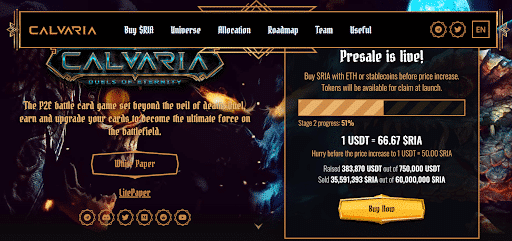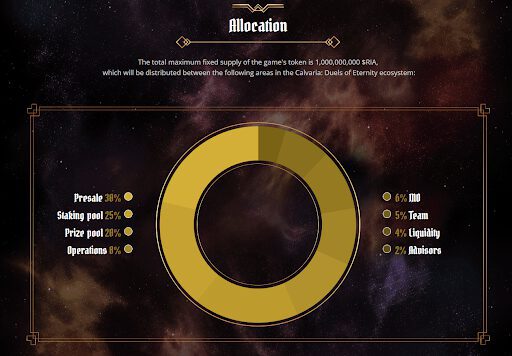
New crypto gaming project Calvaria is gathering huge attention in its presale with experts predicting the native RIA token could increase 25x in the coming months.
The project has already raised nearly $400,000 after only going live this week, with investors excited not only by the play-to-earn Duels of Eternity game, but by the project’s wider vision on driving mass adoption of blockchain gaming.
Calvaria Racing Through Early Presale Stages
Calvaria is now in the second stage of its 10-stage presale, with the native RIA token selling for $0.015 each.
That is up from $0.01 in stage 1, while stage 10 tokens will sell for $0.055 – an increase of 450% or 4.5x and a hard cap of $9.75 million.

While a $100 investment in stage 1 would’ve returned 10,000 RIA, that amount will just be 1,818 by the final stage.
Forecasters are bullish on the RIA token doing a 25x because the coin will be almost at a 5x from its early presale price before it has even hit exchanges and it is expected to be one of the best crypto games to play when it launches.
The project also features strong tokenomics, with a max supply of just 1 billion coins. To reach 25x that means the project needs a market cap of just $250 million – roughly equivalent to GALA Games – and would need each token to reach a price of $0.25.
During the presale, 30% of presale tokens will be sold with no vesting period, meaning they will be tradeable as soon as the coin hits exchanges.
Another 25% of tokens will make up the staking pool and 20% of tokens held for the prize pool.
The final 25% are for the ongoing development of the project and are broken down as follows: operations (8%), INO (6%), team (5%), liquidity (4%), and advisors (2%).
The project’s developers are fully KYC-verified and doxxed, while the RIA token smart contract has been audited.
Calvaria in Drive to Attract Casual and Traditional Gamers
Despite the massive potential of blockchain gaming, the reality is that traditional and casual gamers have not yet made the transition from Web2 to Web3 in any kind of large numbers.
While the likes of Fortnight, Roblox, Minecraft, and Call of Duty attract millions of gamers online every day, blockchain games rarely crack six figures per month.

In fact, according to DappRadar, only Gameta – a platform with a variety of games – is the only Web3 GameFi project to attract more than a million players combined in the last 30 days.
Decentraland and The Sandbox have been dubbed ‘lonely metaverses’ in some news reports, as the two platforms – despite each having a market cap well over $1 billion – have combined to attract less than 20,000 players in the last 30 days.
Calvaria has identified two major obstacles that are stopping players from making the switch and has built its ecosystem with those two issues at the forefront of its thinking.
P2E Gaming can be Prohibitively Expensive
The first issue is the cost of some blockchain and Web3 games is expensive and puts casual and traditional players off from ever trying the games – never finding out if they are even worth the expense.
Many P2E projects require their users to splash out on expensive NFTs or buy tokens to gain access to the game, which immediately turns some players away.

Calvaria will solve that issue by releasing a free-to-play version of the game alongside its P2E version.
Not only will this allow players to play the game for free – learning if they enjoy it, how best to strategize for wins and becoming part of the universe – but Calvaria will also include a visible tracker that shows how much players could have earned had they been playing the P2E version.
Developers hope that the game itself will entice people onto the blockchain side once they realise they can earn rewards and money for playing a game they enjoy, rather than paying out for one.
Players can be put off by Blockchain Technology
Another big roadblock to mass adoption of Web3 gaming is the technical knowledge players need to possess to get started.
At its most basic level, all Web3 players need a crypto wallet to get started – but even that can feel overwhelming to some, especially younger players.

While those who have been in crypto for long enough soon learn the technical aspects and jargon, to anyone starting in the space there is a lot to get to grips with and some simply never try.
To solve that issue, Calvaria will include gamified educational quests that teach new players blockchain technology and how to get started in the space and distribute rewards for completing them.
Excitement Around Duels of Eternity
Calvaria’s main game is Duels of Eternity, a card-based battle and strategy game that sees players align themselves with one of three warring factions and do battle against other players.
The game, set in the afterlife, will require skill, strategy and teamwork to overcome opponents – each faction has its own traits, strengths and weaknesses, and characteristics.

Players must organize their armies to outmaneuver their enemies, stacking their deck and picking the correct cards at opportune times, while also utilizing power-up cards to win.
The game is in full 3D and features not only a player vs player battle mode, but a full single-player campaign mode where players can earn unique cards and power-ups to use against other players.
In the P2E version, players will own their cards, resources, and assets, which will be fully tradeable in the in-game store and on the free market outside of the game.
Duels of Eternity offering Seasonal Development
The most-popular Web2 games have come to rely on a seasonal model that constantly sees the game changing, developing and evolving to not only attract new players but keep its current player-base excited and interested.
Calvaria will adopt a similar approach, with the ecosystem to offer seasonal NFT drops and tournaments, and expansion in the universe and game modes.
The project also has a highly-ambitious roadmap that will see it develop an animated series and comic strip, as well as develop a AAA game.
The developers also want to develop Duels of Eternity into an eSports hub and will eventually create their own in-house team as well as welcome other eSports teams to compete in tournaments for large prize pools.
How to Invest in the Calvaria Presale
Step 1: Get a Crypto Wallet
Investors need a crypto wallet to buy RIA presale tokens. We recommend downloading the Trust Wallet app on mobile devices, or the MetaMask browser extension on desktops.
Both are free to use and compatible with a variety of blockchains.
Step 2: Connect to the Calvaria Website
Visit the Calvaria presale platform and ‘Connect Wallet’, completing the sign-in process.
MetaMask will pop up in another window and require you to fill in your password, while Trust Wallet will ask you for a pin number.
Step 3: Buy ETH or USDT
RIA cannot be bought directly with fiat currency but accepts payment in ETH or UDST.
Investors can purchase either token through a centralized exchange and then transfer back to the wallet, ensuring to carefully select the correct wallet address and network.
Alternatively, investors can skip this step as Calvaria has partnered with Changelly to accept credit card payments on the website
Changelly will convert credit card payments to ETH with a small transaction fee – investors still need a crypto wallet even if they buy RIA directly on the website with a credit card.
Step 4: Buy RIA
Enter the amount of RIA you would like to purchase and choose whether to complete the transaction with ETH or USDT.

Note that there is a minimum investment of 1,000 RIA and there will be an Ethereum transaction (gas) fee attached to the purchase.
That will show up after clicking ‘Buy’ and will require you to approve the transaction.
Step 5: Claim Tokens
Once the transaction is complete, RIA tokens will be stored on the Calvaria website until the presale is totally finished. Details and dates on claiming RIA tokens will follow, but at the correct time, return to the website and press ‘Claim’.
RIA will then appear in your wallet and can be transferred elsewhere.


